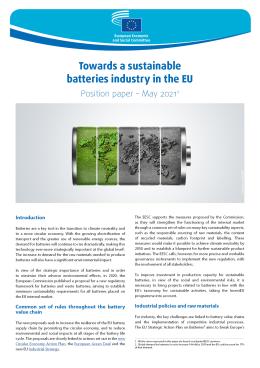European Economic
and Social Committee
Kiertotalous
Siirtyminen kiertotalouteen on tärkeällä sijalla ETSK:n asialistalla, sillä se on yksi keino torjua ilmastokriisiä ja suojella maapalloa. Kierotalous tarjoaa kansalaisyhteiskunnan kannalta erinomaisen tilaisuuden, sillä se voi auttaa
- parantamaan Euroopan teollisuuden kilpailukykyä
- edistämään kestävää talouskasvua
- luomaan uusia työpaikkoja.
Nykytaloudessa edelleen vallitseva lineaarinen tuotanto- ja kulutusmalli paitsi johtaa resurssien haaskaamiseen myös vesittää ilmastonmuutoksen torjuntaa. Toisin kuin lineaarinen talous kiertotalous on uusintava ja korjaava talousmalli, jossa keskitytään taloudellisen arvon luomiseen ja säilyttämiseen. Se tuottaa taloudellista hyötyä, mutta samalla sen avulla myös vastataan maailmanlaajuisiin ympäristöhaasteisiin, kuten ilmastonmuutokseen, biologisen monimuotoisuuden köyhtymiseen ja saastumiseen.
Hyvä uutinen on, että kentällä ollaan jo siirtymässä kiertotalouteen. Kansalaisyhteiskunnan sidosryhmät, kuten yritykset, ammattijärjestöt, tiedemaailma ja osaamisyhteisöt, nuorisojärjestöt sekä kansalaisjärjestöt ja muut eturyhmät, kehittävät ja toteuttavat parhaillaan monia kiertotalousaloitteita paikallis- ja aluetasolla. EU voi vauhdittaa kiertotalouteen siirtymistä parhaiten edistämällä asiaankuuluvien sidosryhmien kehittämiä kiertotalousratkaisuja ja tukemalla niiden johtavaa roolia asiassa.
ETSK ja Euroopan komissio perustivatkin vuonna 2017 yhdessä Euroopan kiertotalouden sidosryhmäfoorumin, joka kokoaa yhteen Euroopan kiertotalousyhteisön. Tämä sidosryhmävetoinen foorumi tukee Euroopan siirtymistä kiertotalouteen edistämällä vuoropuhelua, tiedon jakamista ja parhaiden käytäntöjen vaihtoa.




